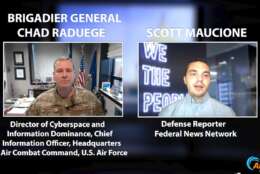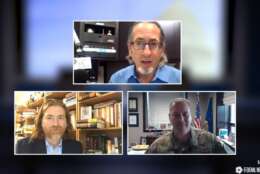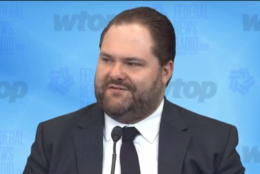zero trust
-
This discussion with Mansour Yusuf, the chief cloud architect at Dell Federal, and Daniel Ellis, a staff Solutions architect at VMware, is part of Federal News Network’s DoD Cloud Exchange.
March 25, 2021 -
While zero trust helps agencies secure their networks against outside adversaries, insider risk can still be a major problem, and many data loss prevention strategies leave gaps and do not effectively address insider risk.
March 18, 2021 -
Few would argue that the pandemic was the killer app for identity management and the move toward zero trust.
March 12, 2021 -
The Department of Homeland Security and the National Security Agency are on the leading edge to do more than test the concepts of zero trust.
February 15, 2021 -
The pandemic has brought to light two important factors for federal agencies. First, to deliver citizen services efficiently and rapidly in a distributed workforce, agencies need more robust IT architectures. Second, cyber threats are growing – and there is an increased need for stronger defenses.
December 08, 2020 -
The cybersecurity world is becoming more complex as threats from abroad and at home amp up the way they attack systems. That’s why many government agencies and companies are subtracting to zero when it comes to trust around their networks.
December 07, 2020 -
The onset of the primarily telework environment within the federal government has moved much of the activity outside the network perimeter. That’s caused a fundamental rethinking of the way federal agencies approach cybersecurity.
December 07, 2020 -
Phil Carrai, President of the Space, Training and Cybersecurity division at Kratos, joins host John Gilroy on this week's Federal Tech Talk to discuss how a surge in satellite launches has spurred innovation in the ground systems that get data from them.
October 20, 2020 -
Agencies are finding out just how closely linked zero trust is with other long-term efforts like ICAM and BYOD as COVID accelerates each.
October 12, 2020 -
While the ICAM policy laid the foundation, the coronavirus pandemic is serving as the “a-ah” moment to illuminate why identity and access management is so important.
September 29, 2020 -
Chi Kang, deputy director for Operations in NOAA’s Cyber Security Division, talked about how the agency made the pandemic shift to large-scale telework and how its modernizing legacy network systems.
September 22, 2020 -
This week on Federal Tech Talk, Nicholas Chaillan, The Air Force's Chief Software Officer, joins host John Gilroy to discuss Platform One and Cloud One, and why they are creative and innovative approaches to improving software for the service.
September 21, 2020 -
In the video interview moderated by Federal News Network’s Tom Temin, Sean Connelly of the Cybersecurity and Infrastructure Security Agency and Air Force Brigadier General Chad Raduege, the cyberspace and information dominance director at the Air Combat Command, talk about how to gain trust, the data and workflows required, and the organizational constructs that best foster trust.
September 14, 2020 -
Education Department CISO Steven Hernandez said the council wanted to plan for the next five to 10 years of agency network priorities and how to prepare for an emergency.
September 08, 2020 -
The most trustworthy IT network is a zero trust network. A growing number of agencies are evaluating how to turn their networks in that direction.
August 21, 2020













